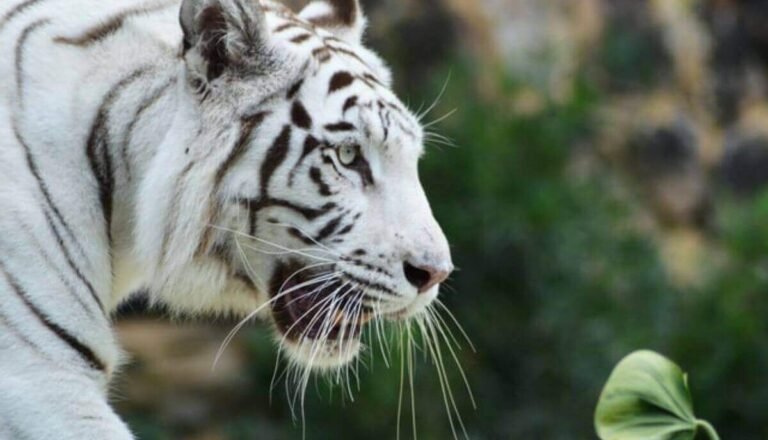Wolf Lifespan: How Long Do Wolves Live? (Explained)
Wolves are one of the most misunderstood creatures on earth. People often think of them as being vicious and dangerous, when in reality they are gentle and timid animals. One of the main reasons for this misunderstanding is because people do not know how long wolves live.
The average lifespan of a wolf is 6-8 years, but some wolves have been known to live up to 13 years old. Wolves typically live in packs with their mate and offspring, but there are also lone wolves who live by themselves. Wolves can be found all over the world, but they are most common in North America and Europe.
Wolves are one of the most fascinating animals in the world. Though they’re often feared, they’re actually quite gentle creatures. One of the things that make them so interesting is their lifespan.
So, how long do wolves live?
On average, wolves live between 6 and 8 years in the wild. However, some individual wolves have been known to live up to 13 years.
In captivity, however, wolves can live much longer – up to 20 years or more.
There are a number of factors that affect a wolf’s lifespan. One of the biggest is habitat loss.
As humans continue to encroach on wild areas, wolves are losing their homes and sometimes even being hunted for sport. This has led to a decrease in the overall population of wolves, which in turn decreases their chances of living a long life.
Disease is also a major factor affecting wolf lifespans.
Wolves can be affected by various diseases, many of which are passed on from other animals (such as coyotes). Some of these diseases can be deadly if not treated quickly enough.
Finally, conflict with humans also takes its toll on wolf populations.
Wolf Lifespan in Wild
In the wild, wolves typically live between 6 and 8 years old. However, some may live up to 13 years old. The oldest recorded wolf in North America was 11 years old.
The oldest recorded wolf in Europe was 12 years old. Wolves in captivity often have much shorter lifespans due to poor diet and lack of exercise.
Wolf Lifespan Captivity
A wolf’s lifespan in captivity is typically shorter than that of a wild wolf. This is due to a number of factors, including diet, stress, and lack of exercise.
In the wild, wolves typically live between 6 and 8 years.
In captivity, however, they often only live for 3 to 5 years. The main reason for this difference is diet. In the wild, wolves eat a variety of foods, including small mammals, birds, fish, and carrion.
They also consume large amounts of vegetation.
In captivity, however, most wolves are fed a diet of commercial dog food or meat scraps. This diet is often lacking in nutrients and can lead to health problems such as obesity and malnutrition.
Additionally, captive wolves are often kept in small enclosures with little opportunity to exercise. This lack of physical activity can also lead to health problems and shorten their lifespan.
Finally, captive wolves often experience high levels of stress due to their close proximity to humans and other animals.
Wolf Lifespan 16 Years
A wolf’s lifespan in the wild is about 16 years. However, this number can differ based on a number of factors such as habitat, food availability, and disease. In captivity, wolves can live much longer – up to 20 years or more!
Wolves are social creatures that live in packs. The pack hierarchy helps keep wolves healthy and safe from harm. The alpha male and female are at the top of the pack, and they typically have the longest lifespans since they have access to the best food and resources.
Lower-ranking members of the pack may not be so lucky – they may only live for 5-10 years if conditions are tough.
Pups are born blind and deaf, but they grow quickly under the care of their parents and other members of the pack. At around 2-3 months old, pups start to explore their surroundings and learn how to hunt with their packmates.
They reach sexual maturity at around 2 years old but often stay with their family until they’re 3-4 years old before striking out on their own.
While wolves in the wild don’t usually live long enough to reach old age, those that do can be quite impressive! The oldest recorded wolf was 29 years old when he was killed by a hunter in Alaska back in 1939.
Why Do Wolves Live Longer Than Dogs
Wolves are perhaps one of the most misunderstood animals in the world. Though they have been portrayed as vicious predators, they are actually very shy and gentle creatures. Wolves live in packs and are very social animals.
They mate for life and are known to be very loyal to their packmates.
One of the main reasons why wolves live longer than dogs is because they are not domesticated. Dogs that are bred by humans often suffer from health problems due to inbreeding.
This is not a problem for wolves since they mate with other wolves outside of their pack.
Another reason why wolves have a longer lifespan than dogs is because they live in the wild. In the wild, wolves have to fend for themselves and hunt for food.
This lifestyle is much healthier than the sedentary lifestyle of many domesticated dogs. Wolves also do not suffer from obesity, which is a common health problem in dogs.
The average lifespan of a wolf is about 12 years while the average lifespan of a dog is only about 10 years.
However, there have been cases where wolves have lived up to 20 years in captivity. It is believed that ifwolves were not hunted by humans, their lifespan would be even longer.
How Long Do Female Wolves Live
How Long Do Female Wolves Live?
Female wolves typically live about 2-3 years longer than males. In the wild, the average lifespan of a wolf is around 6-8 years, but some individuals have been known to live up to 13 years.
Captive wolves tend to have somewhat shorter lifespans, averaging around 4-5 years.
There are several factors that contribute to the longevity of female wolves. One is that they generally avoid fights and other physical confrontations with other wolves.
Females also tend to be less exposed to the dangers of hunting and scavenging than males, as they often stay back at the den with the cubs while the males go off in search of food. Additionally, females typically have access to better quality food sources than males, as they are often first in line at kills. All of these factors work together to help increase the lifespan of female wolves.
How Long Do Timber Wolves Live
Timber wolves are one of the most beautiful and majestic animals in North America. They are also one of the longest living members of the canine family, with an average lifespan of 10-14 years in the wild. However, their life expectancy can vary greatly depending on a number of factors, including their habitat, diet, and whether or not they are subject to human persecution.
In captivity, timber wolves can live much longer – up to 20 years or more. This is due to the fact that they are protected from many of the dangers they face in the wild, such as disease, starvation, and being killed by humans. However, captive wolves still face some challenges, such as boredom and loneliness due to a lack of social interaction with other Wolves.
Whether in captivity or in the wild, it is clear that timber wolves are remarkable creatures with a long lifespan. We should all do our part to protect them so that future generations can enjoy their beauty and majesty for many years to come.
Wolf Lifespan 14 Years
Most wolves in the wild only live for about 6 to 8 years, but some have been known to live much longer. The oldest recorded wolf was 14 years old. In captivity, wolves can live up to 20 years or more.
Wolves in the wild typically die from injuries, starvation, or disease.
Lifespan of a Wolf Male
A wolf’s lifespan in the wild is around 6 to 8 years. However, captive wolves can live up to 16 years old. The average lifespan of a male wolf is shorter than that of a female wolf.
Male wolves typically only live for about 4 to 5 years in the wild, while females can live for up to 11 years.
The main cause of death for wolves is humans. Hunting and trapping are the most common ways that humans kill wolves.
Other causes of death include disease, starvation, and fighting with other wolves.

Credit: www.pbs.org
Why Do Wolves Only Live 5 Years?
There are a number of reasons why wolves only live 5 years, including their high level of activity, their poor diet and their exposure to the elements.
Wolves are highly active animals, spending most of their time running, hunting and playing. This level of activity takes a toll on their bodies and leads to a shorter lifespan than other animals.
Additionally, wolves have a poor diet compared to other carnivores. They eat mostly meat that is low in fat and nutrients, which can lead to health problems over time. Finally, wolves live in harsh conditions where they are exposed to extreme weather and dangerous predators.
This also contributes to a shorter lifespan for these animals.
Can Wolves Live for 20 Years?
Yes, wolves can live for up to 20 years in the wild. In captivity, they have been known to live even longer – up to 30 years. The oldest recorded wolf was 29 years old.
Wolves in the wild typically live between 6 and 8 years, but those that are well-fed and cared for often live much longer.
How Long Do Wolves Live Male And Female?
The average lifespan of a wolf in the wild is around 6-8 years, but some individuals have been known to live up to 13 years. The average lifespan of a captive wolf is 10-13 years. Male wolves tend to have shorter lifespans than females, and this is thought to be due to the higher levels of stress and competition they experience in the wild.
In captivity, however, there is no such difference between the sexes.
Which Wolf Has the Longest Lifespan?
There are many different species of wolf, each with their own lifespan. The longest-lived wolf on record was a captive female from Russia named Kamchatka. She lived to the ripe old age of 17 years and 7 months.
However, in the wild, it is unlikely that any wolf would live longer than about 13 years. The oldest recorded wild wolf was a 12-year-old male from Yellowstone National Park in the United States.
Unbelievable Wolf Facts You Never Knew!
Conclusion
Did you know that the average lifespan of a wolf in the wild is only about 6 to 8 years? That’s shorter than most dogs! But why do wolves only live such a short time?
Let’s find out…
Wolves are apex predators, which means they’re at the top of the food chain. They have few natural predators and they hunt in packs, so they’re very successful hunters.
But this also means they have a high mortality rate. About 60% of wolf pups die before their first birthday. And adult wolves have a high risk of injury or death when hunting.
So, even though wolves are skilled hunters, their lifestyle is dangerous and many don’t live to see old age.
In captivity, however, wolves can live much longer – up to 16 years! This is because they don’t have to worry about things like predation, starvation, or injuries from fighting.
So, if you want your pet wolf to stick around for a while, it’s best to keep them in captivity where they can be better protected from harm.




![What Eats a Vulture? [List of Vulture Predators]](https://proanimalguide.com/wp-content/uploads/2022/12/38b8a696beea424c8c083c3bc8a0de92-768x461.jpg)


